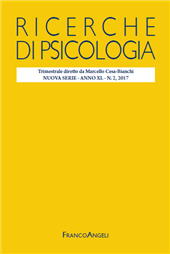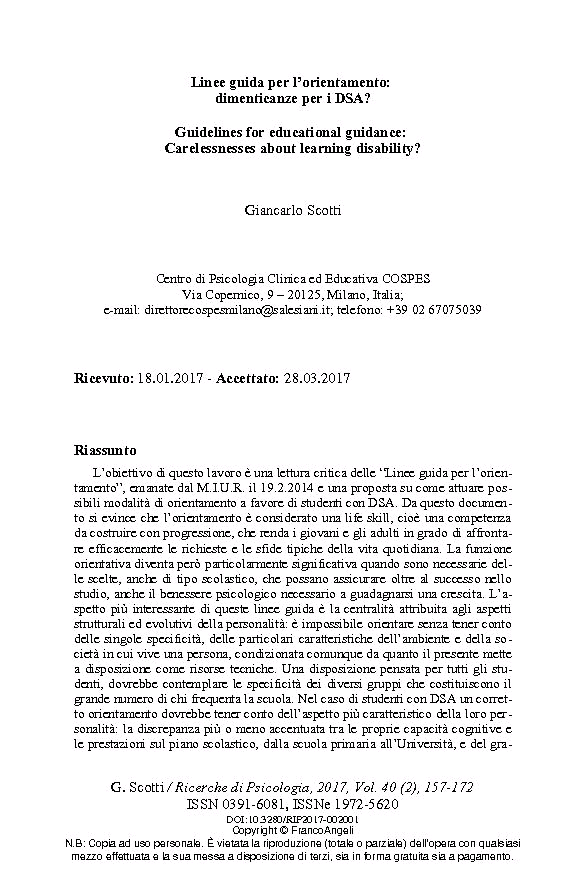Linee guida per l'orientamento : dimenticanze per i DSA?
157-172 p.
L'obiettivo di questo lavoro è una lettura critica delle "Linee guida per l'orientamento", emanate dal M.I.U.R. il 19.2.2014 e una proposta su come attuare possibili modalità di orientamento a favore di studenti con DSA. Da questo documento si evince che l'orientamento è considerato una life skill, cioè una competenza da costruire con progressione, che renda i giovani e gli adulti in grado di affrontare efficacemente le richieste e le sfide tipiche della vita quotidiana. La funzione orientativa diventa però particolarmente significativa quando sono necessarie delle scelte, anche di tipo scolastico, che possano assicurare oltre al successo nello studio, anche il benessere psicologico necessario a guadagnarsi una crescita. L'aspetto più interessante di queste linee guida è la centralità attribuita agli aspetti strutturali ed evolutivi della personalità: è impossibile orientare senza tener conto delle singole specificità, delle particolari caratteristiche dell'ambiente e della società in cui vive una persona, co
ndizionata comunque da quanto il presente mette a disposizione come risorse tecniche. Una disposizione pensata per tutti gli studenti, dovrebbe contemplare le specificità dei diversi gruppi che costituiscono il grande numero di chi frequenta la scuola. Nel caso di studenti con DSA un corretto orientamento dovrebbe tener conto dell'aspetto più caratteristico della loro personalità: la discrepanza più o meno accentuata tra le proprie capacità cognitive e le prestazioni sul piano scolastico, dalla scuola primaria all'Università, e del grado di consapevolezza ed accettazione di chi vive questa disarmonia. Si coglie però, nella lettura di questo documento un'attenzione assai generica alle fasce deboli, un' attribuzione piuttosto magica conferita alle T.I.C. (tecnologie per l'informazione e la comunicazione), ed una sorta di ottimismo, che per studenti con D.S.A. viene spesso smentita dalle evidenze cliniche. Vengono successivamente segnalate le prassi utilizzate c/o i centri COSPES per la prevenzione dell'insucces
so scolastico, e le informazioni ed i dati clinici di cui è necessario avvalersi nel caso di un orientamento alla scuola secondaria di 2° grado e/o all'Università, per studenti con DSA. [Testo dell'editore].
The aim of this work is a critical reading of the "Guidelines for Educational Guidance" issued by the Italian Ministry of Education (MIUR) on 19/02/2014, and to propose possible ways to help students with Learning Disability (L.D.) with their educational guidance. From this paper we deduce that educational guidance is to be considered a life skill, namely an ability which has to be built progressively, and which should make young people and adults able to success-fully deal with daily life challenges. Guidance function becomes particularly im-portant when the students have to make a choice for their own scholastic future. These choices are meant to give assurance of psychological well-being for a bet-ter growth, as well as scholastic success.
The focus on structural and developmental aspects of personality are the most interesting feature of these guidelines: it is impossible to help someone in his own choice without caring about his peculiarities, the environment and society conditions where he lives, and the age he lives in. A document intended for all the students cannot ignore the peculiarities of the different groups that make up the great number of those who go to school. In the case of L.D. students, a proper guidance should care about their peculiarities: the difference between their cognitive abilities and their scholastic performances from elementary school to University, and their consciousness and acceptance of their rubs.
However, reading this paper, we can notice a rather general attention to the weak category, the function conferred to the ICTs (Information and Communication Technologies) with quite magical powers, and a sort of optimism that is contradicted by clinical evidences in students with L.D. See below the good practices for the prevention of scholastic failure for students with L.D. administered by the experts of COSPES centres, and the information and clinical evidences that you should get to undertake an educational guidance path. [Publisher's Text].
Is part of
Ricerche di psicologia : 2, 2017-
Articles from the same issue (available individually)
-
-
Information
ISSN: 1972-5620
DISCIPLINES
KEYWORDS
- Orientamento scolastico, legislazione scolastica sull'orientamento, prevenzione dei DSA, riabilitazione di studenti con DSA con TIC.
- Educational guidance, school legislation on guidance, learning disa-bility rehabilitation with ICT.



